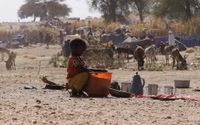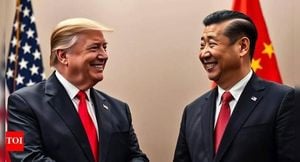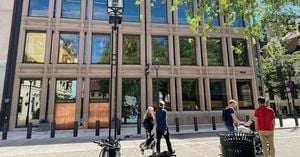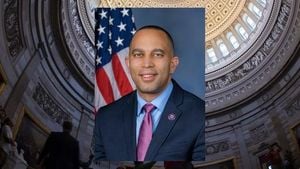The war in Sudan, now raging for well over two years, has once again erupted into tragedy, with at least 16 civilians killed and eight more injured in a fresh assault by the paramilitary Rapid Support Forces (RSF) on the village of Markaz Al-Ziyadiya in North Kordofan State. As reported by volunteer groups and confirmed by the Sudanese Doctors Network, the attack occurred on the evening of August 8, 2025, marking another grim chapter in a conflict that the United Nations has called one of the worst humanitarian crises in recent memory.
According to a statement from the Sudanese Doctors Network, the RSF forces stormed the village, attacking civilians inside their homes and looting residents’ properties. "Yesterday (Thursday) evening, RSF forces attacked the village of Markaz Al-Ziyadiya in North Kordofan State," the network stated, emphasizing the brutality of the incident. Six individuals remain missing, and the group condemned what it described as "a brutal attack," asserting that it constitutes a full-fledged "war crime" and reflects a systematic pattern by the RSF of targeting civilians throughout Sudan.
The Coordination of Resistance Committees in North Kordofan echoed these concerns, confirming the death toll and warning that several others were wounded or taken captive during the assault. The RSF has not yet issued any comment regarding the incident.
This attack is not an isolated incident but part of a larger, increasingly violent struggle between the Sudanese Armed Forces (SAF) and the RSF. Clashes have intensified across the Kordofan region—which includes North, West, and South Kordofan states—with the RSF now controlling most towns in West Kordofan and imposing a siege on El Obeid, the capital of North Kordofan. The ongoing conflict, which erupted in April 2023, has killed tens of thousands and displaced millions, both within Sudan and across its borders, plunging the country deeper into humanitarian catastrophe.
As Middle East Monitor has detailed, the roots of the RSF reach back to 2013, when the group was formed from the remnants of the notorious Janjaweed militia. Initially tasked with supporting government counterinsurgency campaigns in Darfur and South Kordofan, the RSF gained legal status in 2017 after Sudan’s parliament formally approved its operations. Since then, the group has faced widespread allegations of grave human rights abuses—including the torching of villages, killings of protesters, sexual violence, mass executions, arbitrary arrests, and attacks on hospitals, places of worship, and the press.
Perhaps most chilling are the accusations of ethnically targeted violence. UN experts estimate that the RSF has killed around 15,000 members of the Massalit ethnic group in Darfur alone, with atrocities ranging from massacres to the recruitment of child soldiers. In recent months, the militia has besieged El Fasher, the last major safe haven for displaced civilians in Darfur, repeatedly shelling the city and worsening the dire humanitarian situation. Millions, including countless children, are now facing starvation as aid is cut off and violence escalates.
External actors have played a significant role in fueling Sudan’s conflict, with the United Arab Emirates (UAE) emerging as a particularly influential backer of the RSF. According to Middle East Monitor and corroborated by UN sources, the UAE has provided both financial and military support to the RSF, including the supply of foreign combatants and arms. This assistance has reportedly expanded since the outbreak of hostilities in 2023, driven by the UAE’s strategic interests in Sudan’s gold, agriculture, and Red Sea ports, as well as its desire to prevent the resurgence of Islamist groups in the region.
There are even more disturbing allegations regarding the methods used to support the RSF. The UAE is said to have utilized the Russian Wagner Group to facilitate the supply of arms to Sudan, while charities under the control of Mansour Bin Zayed—the UAE’s vice president and owner of Manchester City football club—have allegedly been used to smuggle drones, weapons, and other military equipment to the RSF under the guise of humanitarian aid. The New York Times reported that US intelligence intercepted regular phone calls between Mansour Bin Zayed and Mohamed Hamdan Dagalo, the RSF’s leader, leading to strong suspicions of direct involvement in funding the war.
This alleged relationship has sparked calls for urgent investigation, particularly given the potential violation of the Premier League’s Owners’ and Directors’ Test (OADT). The OADT was amended in March 2023 to include disqualifying events for human rights abuses, in line with the UK’s Global Human Rights Sanctions Regulations 2020. Many believe that if these allegations are substantiated, they could have far-reaching consequences—not just for the individuals involved but for the reputation of Manchester City FC and the integrity of international sport.
Meanwhile, the humanitarian situation on the ground continues to deteriorate. The RSF’s ongoing siege of El Fasher has left millions trapped and starving, with aid agencies warning of imminent famine and the risk of another genocide. The United Nations and other international organizations have repeatedly called for an immediate end to the violence and for unfettered humanitarian access, but so far, these pleas have gone unheeded.
The conflict’s devastation is not limited to Darfur or Kordofan. Across Sudan, the fighting between the SAF and RSF has destroyed countless homes, schools, hospitals, and vital infrastructure. The country’s already fragile economy has collapsed under the weight of war, and the social fabric of entire communities has been torn apart. As one volunteer from the Sudanese Doctors Network put it, "This is not just a war between armies—it is a war on the people of Sudan."
With the RSF now controlling vast swathes of territory and the SAF struggling to maintain its hold on key cities, the prospect of a swift resolution seems remote. The involvement of foreign powers, the proliferation of armed groups, and the deep-seated grievances fueling the conflict all point to a protracted and painful struggle ahead.
For the people of Sudan, hope is in short supply. Yet, the international community’s response—and the willingness of institutions like the Premier League to hold individuals accountable—may prove crucial in shaping the country’s future. As the world watches, the lives of millions hang in the balance, and the need for justice, accountability, and peace has never been more urgent.




